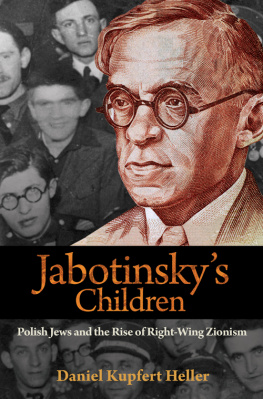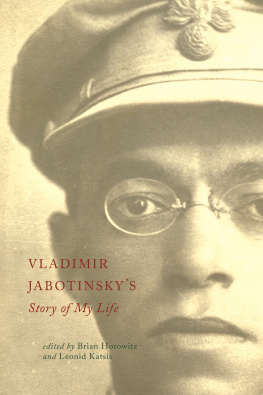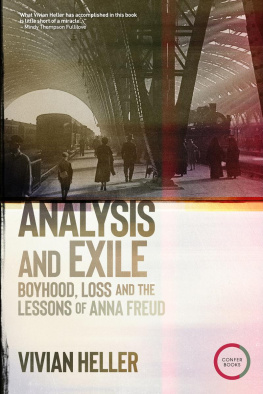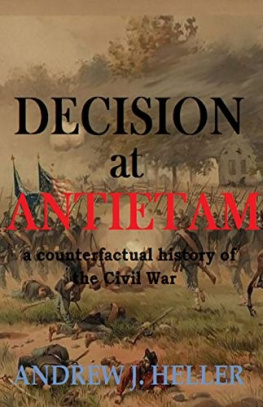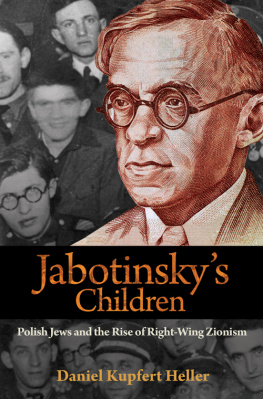Heller Daniel Kupfert - Jabotinskys Children
Here you can read online Heller Daniel Kupfert - Jabotinskys Children full text of the book (entire story) in english for free. Download pdf and epub, get meaning, cover and reviews about this ebook. publisher: Princeton University Press, genre: Politics. Description of the work, (preface) as well as reviews are available. Best literature library LitArk.com created for fans of good reading and offers a wide selection of genres:
Romance novel
Science fiction
Adventure
Detective
Science
History
Home and family
Prose
Art
Politics
Computer
Non-fiction
Religion
Business
Children
Humor
Choose a favorite category and find really read worthwhile books. Enjoy immersion in the world of imagination, feel the emotions of the characters or learn something new for yourself, make an fascinating discovery.
- Book:Jabotinskys Children
- Author:
- Publisher:Princeton University Press
- Genre:
- Rating:4 / 5
- Favourites:Add to favourites
- Your mark:
- 80
- 1
- 2
- 3
- 4
- 5
Jabotinskys Children: summary, description and annotation
We offer to read an annotation, description, summary or preface (depends on what the author of the book "Jabotinskys Children" wrote himself). If you haven't found the necessary information about the book — write in the comments, we will try to find it.
Jabotinskys Children — read online for free the complete book (whole text) full work
Below is the text of the book, divided by pages. System saving the place of the last page read, allows you to conveniently read the book "Jabotinskys Children" online for free, without having to search again every time where you left off. Put a bookmark, and you can go to the page where you finished reading at any time.
Font size:
Interval:
Bookmark:

JABOTINSKY S CHILDREN
Jabotinskys Children
POLISH JEWS AND THE RISE
OF RIGHT-WING ZIONISM
DANIEL KUPFERT HELLER
PRINCETON UNIVERSITY PRESS
PRINCETON & OXFORD
Copyright 2017 by Princeton University Press
Published by Princeton University Press,
41 William Street, Princeton, New Jersey 08540
In the United Kingdom: Princeton University Press,
6 Oxford Street, Woodstock, Oxfordshire OX20 1TR
press.princeton.edu
Jacket images: (Background) Courtesy of the Jabotinsky Institute
in Israel. (Foreground) Zeev Jabotinsky (18801940) on 100 shekel
banknote from 1979. Georgios Kollidas / Alamy Stock Photo
reprinted from Daniel Kupfert Heller (2015), Obedient
children and reckless rebels: Jabotinskys youth politics and the case
for authoritarian leadership, 19311933, Journal of Israeli History, 34:1,
4568, with permission, www.tandfonline.com
All Rights Reserved
ISBN 978-0-691-17475-4
Library of Congress Control Number 2017940318
British Library Cataloging-in-Publication Data is available
This book has been composed in Arno Pro
Printed on acid-free paper
Printed in the United States of America
10 9 8 7 6 5 4 3 2 1
CONTENTS
ILLUSTRATIONS
All photos are reprinted by permission of the Jabotinsky Institute.
reprinted from Yisrael Gutman, Ezra Mendelsohn, Jehuda Reinharz, Chone Shmeruk, eds., The Jews of Poland Between the Two World Wars (Hanover: Brandeis University Press with the University Press of New England, 1989).
ACKNOWLEDGMENTS
THIS BOOK PROVIDED me with numerous opportunities to meet, work with, and learn from an incredible range of people, both within and beyond academia. They have enriched my life in innumerable ways, and I am grateful for the opportunity to acknowledge them here.
I would have never considered a career as a historian were it not for Derek Penslar. As an undergraduate student at the University of Toronto, I was privileged to take several of his classes on the history of Jews in Europe and the Middle East. His range as a historian has long inspired me and played no small role in leading me to choose a project that spanned from Warsaw to Tel Aviv. I am also thankful to Anna Shternshis and Piotr Wrbel for providing me with numerous opportunities at the University of Toronto to cultivate my interest in the history of Jews in eastern Europe.
At Stanford, Aron Rodrigue was an outstanding teacher and adviser throughout my graduate career. I am equally thankful for the sage advice of Norman Naimark. In my early years of graduate school, he generously offered his time to discuss the history of the European Right and the history of Poland. Were it not for those meetings, I would have never thought to write about the Jewish Right. In the same year I met with Norman Naimark for weekly meetings, I also had the privilege of learning with Gabriella Safran. Her graduate seminar on Russian literary theory provided a fruitful forum to think about the relationship between literature and nationalism. Years later, she enthusiastically offered to read this book manuscript in full, and offered helpful comments. I remain, as always, grateful for her encouragement.
My greatest debt of gratitude to a faculty member at Stanford is to my primary dissertation adviser, Steven Zipperstein. His extraordinary level of commitment to training historians as thinkers, teachers, and writers far surpassed anything I expected when I arrived to Stanford. He has offered superb guidance at each and every step of the way. For his wisdom, his encouragement, his generosity, and his kindness, I thank him.
My year as the Hazel D. Cole Fellow at the University of Washington in 2012 provided much-needed time to begin expanding my dissertation into a book. I remain thankful to Noam Pianko and the faculty at the UW Stroum Jewish Studies Program for their advice and encouragement. A special thank you to Devin Naar, whose friendship and intellectual comradeship has informed my work in innumerable ways.
I am grateful to have found an academic home in the Department of Jewish Studies at McGill University. I thank Liane Alitowski, David Auerbach, Eric Caplan, Carlos Fraenkel, Esther Frank, Lea Fima, Anna Gonshor, Gershon Hundert, Yael Halevi-Wise, and Barry Levy for their advice, support, and encouragement. While Ori Yehudai was a postdoctoral fellow in our department, he generously read several chapters of this book and offered deeply insightful comments. So too did James Krapfl in the Department of History and Classical Studies.
Whether at conferences, workshops, or invited lectures, I have been privileged to be in the company of outstanding scholars who have offered helpful comments on my work. My deepest thanks to Natalia Aleksiun, Karen Auerbach, Elissa Bemporad, Kathryn Ciancia, Arie Dubnov, Liora Halperin, Jolanta Mickute, Kenneth Moss, Dan Miron, Tatjana Lichtenstein, Antony Polonsky, Orit Rozin, Anita Shapira, Ellie Schainker, Jeffrey Veidlinger, and Sarah Zarrow. Laurence Weinbaum and Colin Shindler generously shared their expertise on the history of right-wing Zionism and offered critical feedback for this project. I am particularly indebted to Rona Yona and Kamil Kijek for sharing their expertise on Jewish life in Poland between the two world wars.
Numerous librarians and archivists in the United States, Israel, and Poland came to my aid as I searched for documentary evidence for this book. Zachary Baker, the Reinhard Family Curator of Judaica and Hebraica Collections at Stanford, helped bring to the university several microfilms of newspapers written in interwar Poland. Leo Greenbaum and Fruma Mohrer provided helpful guidance at the YIVO Institute for Jewish Research. When I arrived in Israel to mine the archives, I was greeted by Amira Stern, Olga Gekhman, and the wonderful staff at the Jabotinsky Institute. They warmly welcomed me into their archives and tirelessly worked on my behalf to find hundreds of files. Many thanks as well to the dedicated staff in Jerusalem at the Central Zionist Archives and the Central Archives for the History of the Jewish People. Once I arrived in Poland, Yale Reisner of the Jewish Historical Institute (ydowski Instytut Historyczny, IH) helped me determine my archival itinerary in the country. It is my pleasure to thank him, along with the staff at IH, the Archive of Modern Records (Archiwum Akt Nowych), and the National Library (Biblioteka Narodowa). In d, Wocawek, Lublin, Krakw, and Kielce, I was grateful for the help of the staff at the local outposts of the National Archives (Archiwum Pastwowe), who directed me toward a wealth of documents about Jewish life in cities and towns throughout interwar Poland.
This book would not have been possible without the generous support of grants and scholarships provided by the YIVO Institute for Jewish Research, the Memorial Foundation for Jewish Culture, the Mellon Foundation, the Weter Dissertation Completion Fellowship, and the McGill University Start-Up Grant Program.
It has been a privilege to work with Princeton University Press. I am deeply grateful to Fred Appel for his confidence in this project, his thoughtful advice and encouragement, and his efforts to help this book see the light of day. Melanie Mallon, my outstanding copyeditor, offered immensely helpful advice for improving this manuscript.
Portions of were previously published in Obedient Children and Reckless Rebels: Jabotinskys Youth Politics and the Case for Authoritarianism, Journal of Israeli History 34, no. 1 (2015): 4568. I thank Taylor and Francis, publisher, for permitting me to use this material.
Next pageFont size:
Interval:
Bookmark:
Similar books «Jabotinskys Children»
Look at similar books to Jabotinskys Children. We have selected literature similar in name and meaning in the hope of providing readers with more options to find new, interesting, not yet read works.
Discussion, reviews of the book Jabotinskys Children and just readers' own opinions. Leave your comments, write what you think about the work, its meaning or the main characters. Specify what exactly you liked and what you didn't like, and why you think so.

